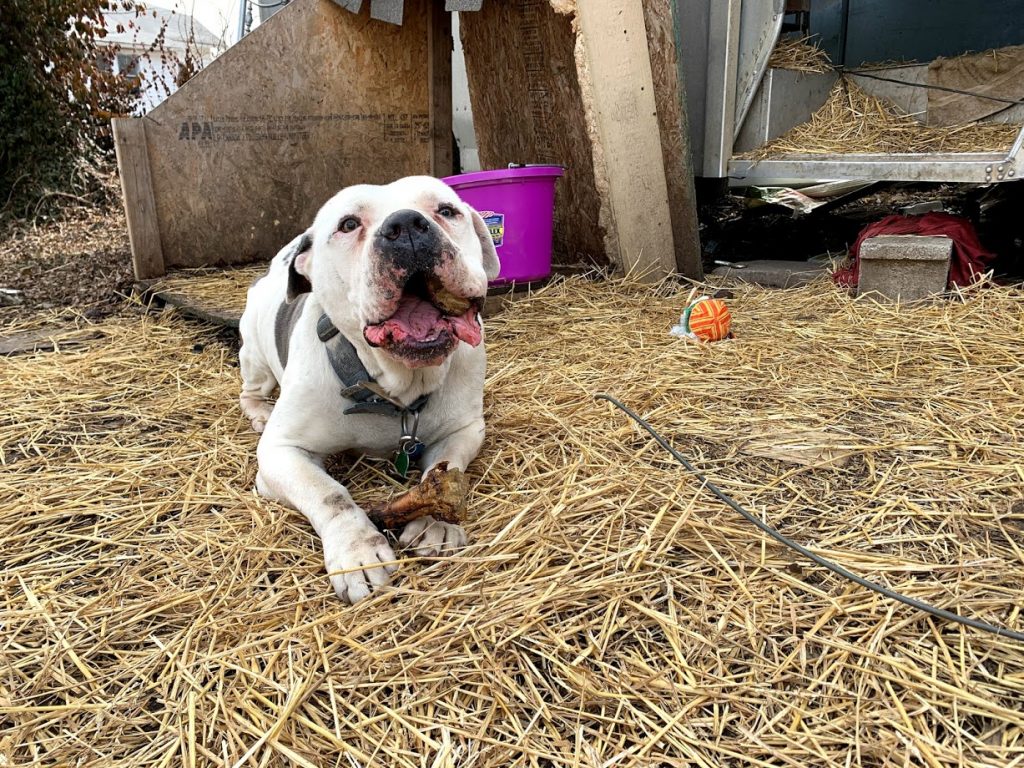Cats and dogs should be kept inside during cold weather
It’s a common belief that dogs and cats are more resistant than people to cold weather because of their fur, but it’s untrue. Like people, cats and dogs are susceptible to frostbite and hypothermia and should be kept inside. Longer-haired and thick-coated dog breeds, such as huskies and other dogs bred for colder climates, are more tolerant of cold weather, but no pet should be left outside for long periods in below freezing temperatures. We don’t recommend keeping any pet outside for long periods of time, but if you are unable to keep your pet inside during cold weather follow these tips to keep your pets safe during winter weather.

Provide Shelter
CATS/COMMUNITY CATS should have a clean, warm place:
- Community or “feral” cats have likely found a warm place to hide, but providing shelter is ideal.
- Styrofoam coolers act a low-cost and efficient shelters. Simply cut a hole for entry on the long side, stuff with straw and replace the lid.
- Always bang on your hood before starting your car as cats and other small animals may hide near a car engine.
DOGS should have a good doghouse with:
- A dry, draft-free space that is big enough for them to sit and lie down comfortably but small enough to hold in their body heat.
- A raised floor that a few inches off the ground and insulated with straw or cedar shavings. (Note: Change the straw or cedar bedding regularly: every month or sooner if it becomes wet.)
- An opening that faces away from the wind – i.e., turn the house so that the opening does not face the west wind. Cover the doorway with burlap or plastic sheeting to help retain your pet’s heat.
Items to keep an eye on during winter weather
WATER: Check your pet’s water source daily. Make sure there is plenty of clean water and that it is not frozen! If it freezes, break the ice, or empty the bowl and replace the water. Use a ceramic or hard plastic water bowl that will not tip over.
FOOD: Feed enough good quality food to keep your pet warm. Dogs and cats need more food in the winter to generate extra heat for warmth.
EXERCISE: Allow your pet to exercise every day. Exercise will help your pet generate body heat to keep warm. Spend time with your pet, play tug with dogs, take them for a walk. Barking is another way that dogs will generate some heat to stay warm, but it is often not appreciated by your neighbors.
GROOMING: Keep your pet’s fur groomed and unmatted. Matted fur won’t protect from the cold. Keep your pet dry. Wet fur can cause your pet to become extremely cold (hypothermia).
Watch for signs of frost bite: Pale, gray skin; Skin that is cold and hard; Tissue looks red when it thaws and turns black a few days later. If your pet becomes excessively cold (hypothermia), warm them up slowly. If you do it too rapidly it may cause more problems for your pet.
Contact the Great Plains SPCA HERO Team at HERO@greatplainsspca.org for assistance providing a pet with proper shelter or if you know of a pet in need. The HERO Team will provide crates and training information for bringing outdoor pets inside, especially during dangerously cold weather. If you would like to donate to help us build crate kits to help bring outdoor pets inside, please consider donating today.
IF YOU SEE AN ANIMAL IN DISTRESS CALL 911!
Click here for a printable version of this article.

